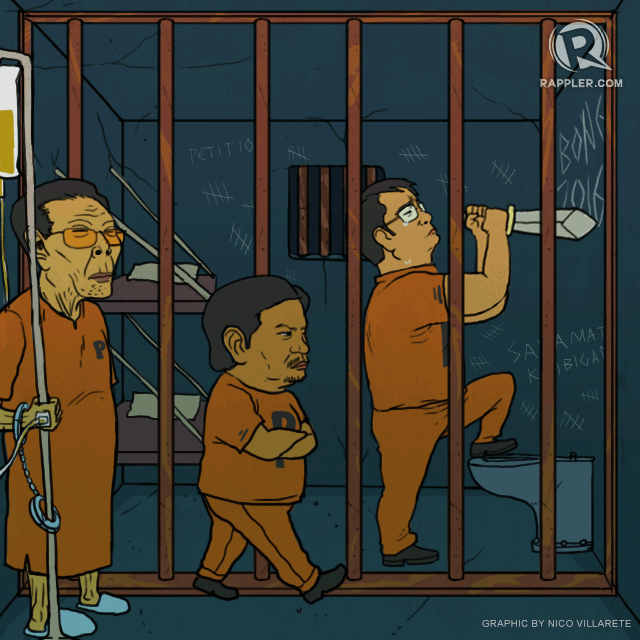SUMMARY
This is AI generated summarization, which may have errors. For context, always refer to the full article.

About a year ago, in a pivotal moment in the Aquino government’s anti-corruption battle, 3 senators were charged with plunder and sent to jail. Juan Ponce Enrile, Jinggoy Estrada, and Bong Revilla were found to have pocketed massive chunks of their PDAF or priority development assistance fund, reaching a total of P579 million ($26 million).
This stunning opening salvo in the PDAF scam indictments was followed by 2 waves of filings. Early this year, the Ombudsman filed cases against 5 congressmen and, this month, announced that graft charges were ready to be filed versus 5 former members of the House of Representatives, led by Aquino ally Rodolfo “Ruffy” Biazon. In a separate case, Zenaida Ducut, also a former congresswoman, was to be charged with bribery.
Of the 14 cases, we take a look at the troika – Enrile, Estrada and Revilla – as they observe their first-year anniversary in detention. How far has the prosecution gone in nailing the senators down?
Sadly, not far. The reasons have to do with systemic delays in overburdened courts.
The year just passed saw a flurry of bail hearings for Revilla and Estrada. Both took the same tack of seeking bail, consuming the time of the Sandiganbayan judges and the prosecution with what may be regarded as a dilatory tactic.
In contrast, Enrile avoided that route and went straight to the Supreme Court, questioning the moves of the prosecution.
Not a single trial has taken place for the troika. But, in the cases of Estrada and Revilla, the prosecution has made the bail hearings work in their favor and they have hit some strides.
The prosecution was able to present evidence – 80% in their estimate – which could be adopted during the trial. This may mean that the trial, once it begins, is not expected to drag.
What’s interesting is the difference in the pace of hearings. Revilla’s has ended – the Sandiganbayan has denied his plea for bail – and trial is expected to start in September. Estrada’s is still going on.
What could account for this? Two different divisions preside over the cases. Revilla’s case is in the sala of the First Division headed by Justice Efren de la Cruz, while Estrada’s sits in the Fifth Division led by Justice Roland Jurado.
De la Cruz has been observed to be firm and decisive, handling the hearings in a fair manner.
In contrast, the Fifth Division justices started on a sour note as they surprisingly decided to inhibit themselves in the Estrada case last year, citing “personal reasons.” They showed tentativeness and appeared to succumb to pressure from various sides. But they were prevailed upon to stay.
Another factor could be Estrada’s arsenal of lawyers. He is backed by 3 aggressive teams.
Overall, however, the delays are not unusual. Studies show that, on the average, cases in the Sandiganbayan take 6 to 10 years to resolve.
But one reform measure is soon to be in place. The anti-graft court will be expanded to 7 divisions (from 5), thanks to a recently passed law.
The Ombudsman, for its part, has braced itself for these milestone cases and organized the prosecution in cross-cutting teams that cover at least 2,000 documents, computer forensics, pleadings, Anti-Monday Laundering Council reports, and the whistleblowers. There is a mountain of work ahead of them.
Fortunately, under Conchita Carpio-Morales, the Office of the Ombudsman enjoys public support, a vital part of the fight against corruption. This is a golden moment to go after the big fish. – Rappler.com
Add a comment
How does this make you feel?
There are no comments yet. Add your comment to start the conversation.